|
|
|
Sort Order |
|
|
|
Items / Page
|
|
|
|
|
|
|
| Srl | Item |
| 1 |
ID:
187111
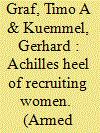

|
|
|
|
|
| Summary/Abstract |
The German Bundeswehr, like other NATO forces, seeks to recruit more women in order to improve its gender balance and to meet its personnel needs. However, previous research on military recruitment has paid little attention to women. Given that the (German) military is still a male-dominated organization, we argue that women’s opinion regarding the realization of gender equality in the military may very well be the Achilles heel of recruiting women. Based on the assumption that women value gender equality in the work environment, we test the hypothesis that women are more attracted to the military as a (potential) employer, the more they think the military has achieved gender equality. A multivariate analysis of nationally representative survey data from Germany from 2019 provides empirical evidence to support this hypothesis. Practical and theoretical implications are discussed.
|
|
|
|
|
|
|
|
|
|
|
|
|
|
|
|
| 2 |
ID:
171110
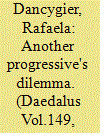

|
|
|
|
|
| Summary/Abstract |
Immigration and the diversity it brings have led to the emergence of the “progressive's dilemma” whereby open societies that take in immigrant outsiders may find it difficult to maintain the solidarity required to sustain the welfare state. In this essay, I address another progressive's dilemma: Focusing on the case of Western Europe, I argue that when open borders give rise to radical-right parties, immigration can inadvertently also endanger progressive achievements in gender equality. Though xenophobic policies frequently constitute their core message and the primary source of their appeal, radical-right parties are also defenders of traditional family values and outspoken critics of measures that promote the economic and political advancement of women. Moreover, the composition of these parties, both in terms of voters and politicians, is disproportionately male. As a result, when radical-right, anti-immigrant parties enter national parliaments, the descriptive and substantive representation of women suffers, sometimes reversing long-held gains in gender equality.
|
|
|
|
|
|
|
|
|
|
|
|
|
|
|
|
| 3 |
ID:
184658
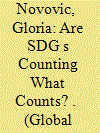

|
|
|
|
|
| Summary/Abstract |
The 2030 Agenda for Sustainable Development (Agenda 2030) encompasses social, economic, and environmental commitments within a single global framework. However, experts have been warning that the ambitious nature of Agenda 2030’s Sustainable Development Goals (SDG s) might be lost in indicator-driven implementation. This article examines the assumption that SDG indicators result in policy shrinking (offering a less ambitious framing) by exploring how the framing of Agenda 2030’s gender commitments shifts from SDG s to their indicators. Employing critical frame analysis, this article shows that SDG global indicators result in policy shrinking of gender-specific targets in terms of their 1) human rights framing 2) overall scope, and 3) inclusivity of target groups. This policy shrinking does not necessarily undermine Agenda 2030, but it does call for greater attention, especially by actors promoting gender equality, to national interpretations of specific SDG targets and the inclusivity of otherwise marginalized policy target groups.
|
|
|
|
|
|
|
|
|
|
|
|
|
|
|
|
| 4 |
ID:
152041
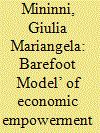

|
|
|
|
|
| Summary/Abstract |
Social and cultural constraints in remote rural areas alienate women and limit their human development. However, there is potential for engagement in educational and economic activities to support their empowerment and the achievement of wider development goals. I discuss the case study of the Barefoot College from India where illiterate women have been involved for over 20 years in training in small-scale solar energy technology solutions. I argue that the participation in the solar program has the potential to support women’s ‘effective’ and ‘transformative’ empowerment, as my sample demonstrates. Through the training, poor women have the opportunity to have an income, learn new skills and foster employment opportunities. The engagement with the organization also supports raising their awareness and enables them to become agents of change. By challenging intra-household dynamics and societal customs, women pursue greater empowerment. Due to its unique model, the training program that started in rural Rajasthan scaled up internationally and has been replicated in several countries in south-east Asia, Africa and Latin America.
|
|
|
|
|
|
|
|
|
|
|
|
|
|
|
|
| 5 |
ID:
168017
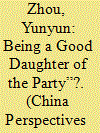

|
|
|
|
|
| Summary/Abstract |
Like other socialist institutions surviving in China’s market reforms, the All-China Women’s Federation (ACWF or WF when referring to its local branches), as the only state-sponsored organisation representing women’s interests, has been constantly refashioning itself to meet new existential challenges. In July 2015, the central leadership of the Chinese Communist Party commanded a new wave of mass organisational reforms, in which the Women’s Federation’s alienation from the grassroots and a weakening representation of women’s interests were questioned. After three years of intensive reform, are the local structures of the ACWF being substantially improved to reconnect to its mass base? Drawing from extensive fieldwork in three provinces and a neo-institutional analysis, this article argues that in the short term, although the reform serves principally as a consolidation of Party authority, local Women’s Federations are creatively using the reform to expand their popular base and broaden their representativeness. In the long term, however, local WFs are facing unreformed institutional problems such as political marginalisation, bureaucratisation, and ineffective implementation, which stagnate further development of China’s state feminism.
|
|
|
|
|
|
|
|
|
|
|
|
|
|
|
|
| 6 |
ID:
129029
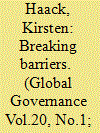

|
|
|
|
|
| Publication |
2014.
|
| Summary/Abstract |
The appointment of Christine Lagarde in 2011 to the leadership of the International Monetary Fund may have been a highlight for women's representation in international organizations, suggesting that the final glass ceiling for women in global governance has been broken. However, this article shows that leadership and representation by women in global governance continues to be curtailed by "glass walls" on the one hand, and flexible glass ceilings on the other. While women in UN agencies today stand on firmer floors, relying on a stronger institutional framework and increasing numbers of women working at all levels of the UN system, women are channeled into gender-specific portfolios, creating glass walls. Moreover, glass ceilings, once shattered, may indeed resettle as recent staff changes by Ban Ki-moon show. Thus, the picture of women's representation and gender equality in UN leadership is a mixed one.
|
|
|
|
|
|
|
|
|
|
|
|
|
|
|
|
| 7 |
ID:
175149
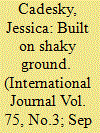

|
|
|
|
|
| Summary/Abstract |
In October 2017, Canada launched its Feminist International Assistance Policy (FIAP). While Canada’s explicit use of the words “feminist” and “feminism” may be refreshing, critical questions on the FIAP’s interpretation and application of these concepts remain. These challenges are not unique to the FIAP. Rather, the central weaknesses of the FIAP can be seen as symptomatic of several endemic challenges that persist in the current policies and practices that seek to promote gender equality in the developing world and beyond. This article presents the theoretical and conceptual lineage that has informed the FIAP, drawing from challenges present within literature on security, gender equality, and gender mainstreaming. Three main shortcomings relevant to both the literature and the FIAP are explored: first, the assumptions and essentialization of “gender” to mean “women”; second, the frequent conflation of “gender equality” with “women’s empowerment”; and last, the paradox of gender, gender equality, and feminism being simultaneously over-politicized and depoliticized to suit prevailing policy environments, with particular implications for the global coronavirus pandemic, as well as impacts in fragile and conflict-affected states. This analysis sheds light on persistent challenges in feminist foreign policymaking and offers insights for the development of Canada’s White Paper on feminist foreign policy.
|
|
|
|
|
|
|
|
|
|
|
|
|
|
|
|
| 8 |
ID:
111653
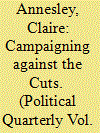

|
|
|
|
|
| Publication |
2012.
|
| Summary/Abstract |
The Coalition's economic strategy poses a significant threat to gender equality in the UK. In the absence of committed gender equality advocates in the government, campaigning is, again, from the outside. This article presents some of the new strategies developed by individuals and organisations such as the Women's Budget Group and the Fawcett Society to fight against the cuts and considers the effectiveness of their approaches.
|
|
|
|
|
|
|
|
|
|
|
|
|
|
|
|
| 9 |
ID:
191958
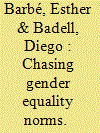

|
|
|
|
|
| Summary/Abstract |
This article studies Sexual and Reproductive Health and Rights (SRHR) at the United Nations (UN). SRHR, a gender equality norm that applies human rights to sexuality and reproduction, have traditionally been supported by a network of actors led by the United States (US) and the European Union. Nevertheless, a rival network has contested SRHR since their conception in the early 1990s. We study the robustness of SRHR in five UN fora between 2009 and 2020, focusing on actor constellations, productive power and norm concordance. Between 2009 and 2016, the normative status quo was maintained, except in the Human Rights Council and the Security Council. In 2017, the US joined the network of rivals and accelerated the norm’s weakening in the Security Council and the Commission on Population and Development. However, to weaken or strengthen the norm further, both networks see a need to address SRHR outside the UN.
|
|
|
|
|
|
|
|
|
|
|
|
|
|
|
|
| 10 |
ID:
168252
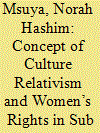

|
|
|
|
|
| Summary/Abstract |
This article discusses the challenges of the realization of women’s rights in relation to the concept of culture relativism in sub-Saharan Africa. It examines how the concept of culture is misconstrued with a traditional hierarchy and patriarchy approach that intervenes in the realization of women’s rights in sub-Saharan African states. Many societies are concerned that the promotion of gender equality would interfere with local culture; hence they feel that gender equality should not be promoted for ethical reasons. Women have been left with the unpleasant situation of choosing between their rights or their culture. Through secondary analysis and a critical review of the literature, the article engages in the debate on cultural diversity and gender equality, to challenge the existing stereotypes in sub-Saharan African cultures. It argues that traditional and cultural practices should adhere to the values of equality and human rights. The article proposes that cultural considerations will have to yield whenever a clear conflict with human rights norms becomes apparent.
|
|
|
|
|
|
|
|
|
|
|
|
|
|
|
|
| 11 |
ID:
168878
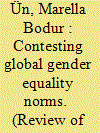

|
|
|
|
|
| Summary/Abstract |
Over the past two decades, constructivist International Relations (IR) scholars have produced substantial knowledge on the diffusion and adoption of global norms, emphasising the role of Western norm entrepreneurs in constructing and promoting new norms to passive, generally non-Western, norm takers. An emergent literature on norm dynamics unsettles this narrative of linear progress, highlighting the agency of diverse actors, including the agency of non-Western norm entrepreneurs, in normative change. This article contributes to this recent norm research by exploring the normative agency of local actors in the Turkish context, who have actively engaged in normative contestation over the meaning of gender equality. More specifically, the article reveals the crucial role of a pro-government, conservative women's organisation in subverting global gender equality norms and in promoting a local norm of ‘gender justice’ as an alternative. The article furthers research on norm contestation by analysing the discursive strategies and justifications local norm makers have adopted in the Turkish context upon encountering norms that challenged their normative beliefs and practices. Finally, the article critically engages with postsecular feminism, highlighting the agency of a religiously informed, conservative women's organisation as a non-Western norm entrepreneur.
|
|
|
|
|
|
|
|
|
|
|
|
|
|
|
|
| 12 |
ID:
083477
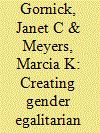

|
|
|
|
|
| Publication |
2008.
|
| Summary/Abstract |
In this article, we describe the social and economic changes that have contributed to contemporary problems of work-family conflict, gender inequality, and risks to children's healthy development. We draw on feminist welfare state scholarship to outline an institutional arrangement that would support an earner-carer society-a social arrangement in which women and men engage symmetrically in paid work and unpaid caregiving and where young children have ample time with their parents. We present a blueprint for work-family reconciliation policies in three areas-paid family-leave provisions, working-time regulations, and early childhood education and care-and we identify key policy design principles. We describe and assess these work-family reconciliation policies as they operate in six European countries widely considered to be policy exemplars: Denmark, Finland, Norway, Sweden, Belgium, and France. We close with an analysis of potential objections to these policies.
|
|
|
|
|
|
|
|
|
|
|
|
|
|
|
|
| 13 |
ID:
192851
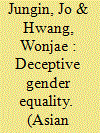

|
|
|
|
|
| Summary/Abstract |
Despite achievements in women’s economic and political empowerment, gender inequalities persist in the key socioeconomic areas of health and education in Laos. How can we explain these gaps in equality? We analyze how Lao people perceive gender equality and how differences in the perception of multiple dimensions of gender equality affect women’s rights in healthcare and education. The results of a 2023 survey of 664 Laotians highlight the perception of equal responsibilities as the key dimension of gender equality, which may limit the improvement of gender equality in health. The results imply that female leadership and greater public consideration of gender equality with respect to rights and opportunities may promote gender equality in Laos. This study contributes to the study of perceptions and practices of gender equality in non-Western countries.
|
|
|
|
|
|
|
|
|
|
|
|
|
|
|
|
| 14 |
ID:
171112
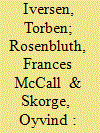

|
|
|
|
|
| Summary/Abstract |
Women shoulder a heavier burden of family work than men in modern society, preventing them from matching male success in the external labor market. Limiting working hours is a plausible way to level the playing field by creating the possibility of less gendered roles for both sexes. But why then are heavily regulated European labor markets associated with a smaller share of women in top management positions compared with liberal market economies such as in the United States? We explain this puzzle with reference to the difficulty of ambitious women to signal their commitment to high-powered careers in regulated markets.
|
|
|
|
|
|
|
|
|
|
|
|
|
|
|
|
| 15 |
ID:
189955
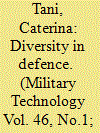

|
|
|
| 16 |
ID:
119689
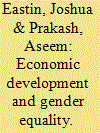

|
|
|
|
|
| Publication |
2013.
|
| Summary/Abstract |
This research note examines the relationship between economic development and gender equality. Drawing on the concept of the Kuznets curve, the authors hypothesize that the relationship between economic development and gender inequality is curvilinear (S shaped), with three distinct stages. In the first stage, economic development improves gender equality because it enables greater female labor-force participation. An independent income stream increases women's intrahousehold bargaining power. The opportunity to develop human capital confers greater political and social recognition. In the second stage, labor-force stratification and gender discrimination encourage divergent male/female income trajectories, which decrease the opportunity costs of female labor-force withdrawal and lend traction to social resistance against burgeoning gender norms. Consequently, there is a deceleration in initial equality gains. In the final stage, gender equality again improves, as greater educational participation and technological advancement provide new employment opportunities for women, increase the opportunity costs of staying home, and encourage the evolution of new social institutions and norms that overcome prior discriminatory practices. The authors find support for this argument in statistical tests of the relationship between economic development and gender equality on a panel of 146 developing countries for the period 1980-2005. They employ four indicators that reflect distinct dimensions of women's political, social, and economic status. They find economic development positively influences gender equality when per capita incomes are below $8,000-$10,000. These equality gains level off or decline slightly in the second stage, from $8,000-10,000 to about $25,000-$30,000. Beyond this level, economic development is again associated with improvements in gender equality. The key implication is that the effect of economic development on gender equality is contingent on the level of development. Policymakers and social activists should develop policy correctives to ensure that economic development confers improvements in gender equality across phases of development.
|
|
|
|
|
|
|
|
|
|
|
|
|
|
|
|
| 17 |
ID:
120941
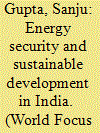

|
|
|
| 18 |
ID:
174557
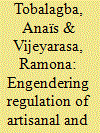

|
|
|
|
|
| Summary/Abstract |
This article argues that adopting a gender perspective when regulating artisanal and small-scale mining (ASM) is both necessary and achievable. The authors analyse women’s often-ignored needs and experiences as workers, decision-makers and affected community members in the ASM sector. To address these concerns, this article sets out standards for regulating ASM to guarantee women’s access to services and information and women’s decision-making and representation; to address the specific risks women face in the sector; and to provide access to effective remedies. The authors use international instruments to identify good practice benchmarks from which legislators and policymakers can draw. The article also notes where global norms fall short of addressing women’s rights in ASM. Some of the limitations of this approach are also acknowledged, notably the challenge of establishing gender-responsive laws that can be feasibly and effectively implemented. Nonetheless, the proposed approach should be favoured to better respond to the highly masculinised nature of the sector and the differentiated impacts of ASM on men and women while recognising women’s roles as beneficiaries and productive agents of the sector.
|
|
|
|
|
|
|
|
|
|
|
|
|
|
|
|
| 19 |
ID:
178615
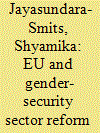

|
|
|
|
|
| Summary/Abstract |
This article is a contribution to critical International Relations scholarship on European Union foreign and security policy and to the debates on “Normative Europe”. It focuses on the ways in which the EU engages with their own gender equality policies in external Security Sector Reform (SSR) missions. By analysing visual materials of the European Union Advisory Mission-Ukraine (EUAM Ukraine) and European Union Capacity Building Mission in Sahel Mali (EUCAP Sahel Mali) missions, this article identifies the discrepancies between the EU’s proclaimed policy goals about gender equality and visual representations of women and men in the missions’ newsletter photos. These representations reflect a lacklustre approach and suggest a lack of commitment to practices of gender equality and positive role modelling in SSR’s day-to-day activities. This article suggests the EU-SSR missions overhaul their public communication strategies to focus first on “how” to communicate gender equality norms and only then on “what” to communicate. This study shows one concrete opportunity and space where this can be achieved.
|
|
|
|
|
|
|
|
|
|
|
|
|
|
|
|
| 20 |
ID:
155510
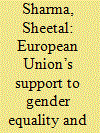

|
|
|
|
|
|
|
|